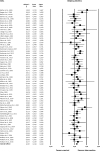The Benefits of Psychosocial Interventions for Mental Health in People Living with HIV: A Systematic Review and Meta-analysis
- PMID: 28361453
- PMCID: PMC5758656
- DOI: 10.1007/s10461-017-1757-y
The Benefits of Psychosocial Interventions for Mental Health in People Living with HIV: A Systematic Review and Meta-analysis
Abstract
In this systematic review and meta-analysis we investigated the effectiveness of different psychosocial treatments for people living with HIV (PLWH) and mental health problems. Additionally, characteristics that may influence the effectiveness of a treatment (e.g., treatment duration) were studied. PubMed, PsycINFO and Embase were searched for randomized controlled trials on psychosocial interventions for PLWH. Depression, anxiety, quality of life, and psychological well-being were investigated as treatment outcome measures. Sixty-two studies were included in the meta-analysis. It was found that psychosocial interventions for PLWH had a small positive effect on mental health (ĝ = 0.19, 95% CI [0.13, 0.25]). Furthermore, there was evidence for publication bias. Six characteristics influenced the effectiveness of a treatment for depression. For example, larger effects were found for studies with psychologists as treatment providers. To conclude, this systematic review and meta-analysis suggests that psychosocial interventions have a beneficial effect for PLWH with mental health problems.
En esta revisión sistemática y meta-análisis se ha investigado la efectividad de los diferentes tratamientos psicosociales para las personas viviendo con VIH (PVVIH) y con problemas de salud mental. Adicionalmente, hemos estudiado las características que pueden influir en la efectividad de un tratamiento (por ejemplo, duración del tratamiento). Como medidas de tratamiento, pruebas controladas aleatorizadas de las intevenciones psicosociales para depresión, ansiedad, calidad de vida y bienestar psicológico fueron buscadas en PubMed, PsycINFO y Embase. Sesenta y dos estudios se han incluido en el metanálisis. Hemos encontrado que intervenciones psicosociales para las PVVIH tuvieron un menor efecto positivo en la salud mental (ĝ = 0.19, IC del 95% [0.13, 0.25]). Además, hubo evidencia de sesgo en la publicación. Seis características influyeron la efectividad del tratamiento para la depresión. Por ejemplo, hemos encontrado efectos mayores en estudios con psicólogos como proveedores del tratamiento. Concluyendo, esta revisión sistemática y meta-análisis indica que las intervenciones psicosociales tienen un efecto beneficioso para gente con PVVIH y con problemas de salud mental.
Keywords: Depression; HIV; Mental health; Meta-analysis; Psychosocial intervention.
Conflict of interest statement
Conflict of interest
All the authors declare that they have no conflict of interest.
Ethical Approval
This article does not contain any studies with human participants or animals performed by any of the authors.
Figures
References
-
- Pence BW, Miller WC, Whetten K, Eron JJ, Gaynes BN. Prevalence of DSM-IV-defined mood, anxiety, and substance use disorders in an HIV clinic in the southeastern United States. JAIDS. 2006;42(3):298–306. - PubMed
Publication types
MeSH terms
Grants and funding
LinkOut - more resources
Full Text Sources
Other Literature Sources
Medical





